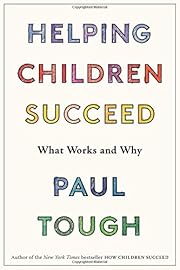

Click on a thumbnail to go to Google Books.
|
Loading... Helping Children Succeed: What Works and Whyby Paul Tough
 Books Read in 2016 (2,839) No current Talk conversations about this book.   ) )This is a sequel to the author's previous book "How Children Succeed." He lays out simple principles to help children from low-income family in their early childhood development and their public school years. He describes many local family health or educational programs that subscribe to these principles and calls for a larger awareness of these principles and a grander scale of implementation in government programs. Basically for early childhood kids, you focus on giving them an environment in which caregivers are responsive to their communication and emotional cues. Regular in-home visits during which the specialist encourage/praise positive interactions works pretty well. For school age kids, you focus on increasing their sense of belonging, competence, and autonomy. In order to do that, teachers should strengthen their relationship with students and incorporate more team-based and project-based activities in the classroom. “Our usual intuition when children and adolescents misbehave is to assume they’re doing so because they have rationally considered the consequences of their actions and calculated that the benefits of misbehavior outweigh the costs. And so our response is usually to try and increase the cost of misbehavior by ratcheting up the punishment they receive. But this only makes sense if a child’s poor behavior is the product of a rational cost-benefit analysis. And, in fact, one of the chief insights that the neurobiological research provides is that the behavior of young people, especially young people who have experienced significant adversity, is often under the sway of emotional and psychological and hormonal forces that are far from rational. “This doesn’t mean, of course, that teachers should excuse or ignore bad behavior in the classroom, But it does explain why harsh punishments so often prove ineffective over the long term that school-discipline programs might be more effective if they were to focus less on imposing punishment and more on creating a classroom environment in which students who lack self-regulatory capacities can find the tools and context they need to develop them.” P54 So, increasing consequences doesn’t cause better behavior. The flip side is also true: rewards also don’t seem to motivate, since, as soon as the rewards are withdrawn, performance often goes down. Instead, author Paul Tough argues that motivation must be intrinsic – spurred by autonomy, competance, and relatedness. These are the foundations that can produce the basics for true success which Tough believes rely on self-control and grit – the ability to care about the result and the courage to try again. Since this is a very different system that was encouraged for parents (like me!) to use in earlier decades which relied on good and bad consequences, he examines how one can produce these characteristic in children, especially those who have not learned these behaviors due to difficult home situations or conditions making such learning more difficult. A very well thought out, presented, and informative look at educating the youth, especially those disadvantaged due to poverty, stereotype, location, and disability (namely ADHD/ADD/Autism). Pertinent information for teachers, educators, school officials, and parents all alike. Those from the start of the curriculum to the end of it. Those raising the child and those looking after the child. The onus is on everyone to better the life of every child, and the biggest way to do that is through education. Unfortunately, typically, the education in the poorer sections or the African-American/Latino sections tend to be subpar comparatively; and altogether as the later chapters show, the education in America itself is lacking in comparison to countries like Japan. This is something that needs work on, and studies need to be done, and information needs to be accessed, fact checked, read, studied, and plans created and put into practice. And the only way to do that, is to take the time, spend the money, and do the research, and books like this will help us get that research done, help us bridge these gaps, and help us better educate the children and youth, thus ensuring the future for them, as well as ourselves. no reviews | add a review
Education.
Sociology.
Nonfiction.
In How Children Succeed, Paul Tough introduced us to research showing that personal qualities like perseverance, self-control, and conscientiousness play a critical role in children's success. Now, in Helping Children Succeed, Tough takes on a new set of pressing questions: What does growing up in poverty do to children's mental and physical development? How does adversity at home affect their success in the classroom, from preschool to high school? And what practical steps can the adults who are responsible for them-from parents and teachers to policy makers and philanthropists-take to improve their chances for a positive future? Tough once again encourages us to think in a brand-new way about the challenges of childhood. Rather than trying to "teach" skills like grit and self-control, he argues, we should focus instead on creating the kinds of environments, both at home and at school, in which those qualities are most likely to flourish. Mining the latest research in psychology and neuroscience, Tough provides us with insights and strategies for a new approach to childhood adversity, one designed to help many more children succeed. No library descriptions found. |
Current DiscussionsNonePopular covers
 Google Books — Loading... Google Books — Loading...GenresMelvil Decimal System (DDC)372.1Social sciences Education Primary education (Elementary education) Organization and activities in primary educationLC ClassificationRatingAverage: (3.88) (3.88)
|
||||||||||||||||||||||||||||||||||||||||||||||||||||||||||||||||||||||||||||||||||||||||||||||||||||||||||||||||||||||||